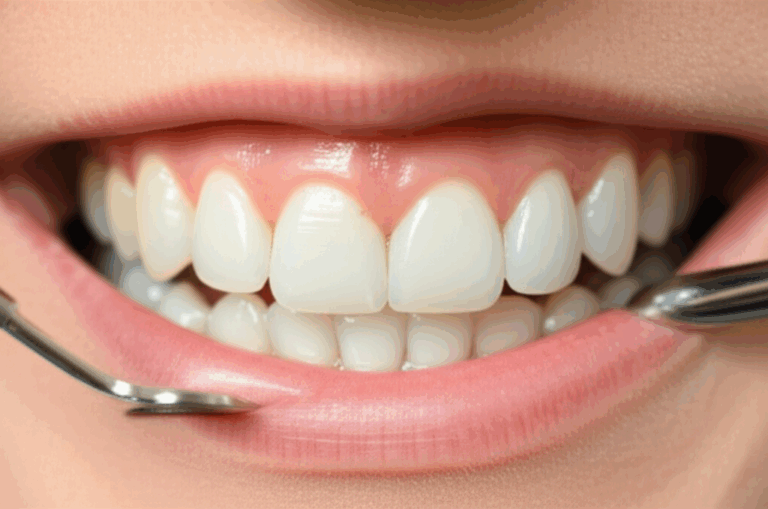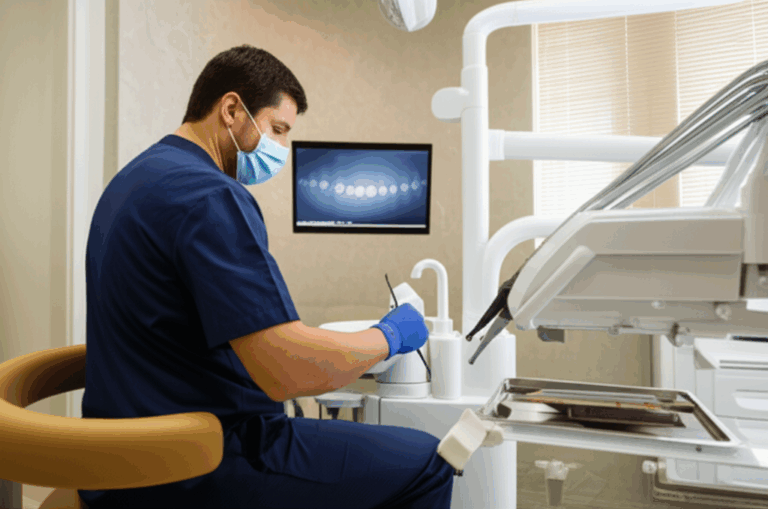
Dentist vs. Endodontist: Understanding the Key Differences for Your Oral Health
Ever sat in your dentist’s chair, nervously looking at the tray of shiny tools, and wondered, “Wait, why is my dentist sending me to someone called an endodontist?” Or maybe your tooth is hurting so much that your morning coffee feels like a cruel joke. If you’re not sure what an endodontist does, how that is different from your usual dentist, and—most importantly—how you should fix your tooth pain, you’re in the right place.
This guide will clear up the confusion. I’ll explain exactly what makes a general dentist different from an endodontist, when you should see each one, and how they work together to keep your mouth healthy and happy. By the end, you’ll know not just who does what—but why it matters for your comfort and peace of mind.
In This Article
- Introduction: Navigating Your Dental Health Journey
- What is a General Dentist? (Your Main Dental Care Provider)
- What is an Endodontist? (The Root Canal Specialist)
- Key Differences: Dentist vs. Endodontist at a Glance
- Why Does This Distinction Matter for Your Oral Health?
- Collaboration in Care: How They Work Together
- Frequently Asked Questions (FAQs)
- Conclusion: Making Informed Decisions About Your Dental Care
Introduction: Navigating Your Dental Health Journey
Let’s be real—most of us don’t think much about the difference between dental workers until we’re dealing with a problem. Maybe you got sent to a specialist, or you’re searching online about that annoying toothache. It can feel confusing.
You’re not alone. Lots of people have the same questions: “Shouldn’t my normal dentist fix this?” “Is a root canal really that hard?” “Do I really have to see another person?” Knowing these roles helps you make smarter choices for your health.
That’s what this simple guide is for. Whether you need a check-up, want a brighter smile, or have a tooth throbbing down your jaw, you’ll learn which expert to go to—and why.
What is a General Dentist? (Your Main Dental Care Provider)
Think of your general dentist as the family doctor for your teeth—they see all ages, handle everything from little cavities to regular cleanings, and are your first stop for mouth health.
Education and Training
A general dentist works hard for this job:
- 4 years of college (usually in science)
- 4 years of dental school to get a D.D.S. (Doctor of Dental Surgery) or D.M.D. (Doctor of Medicine in Dentistry)
They learn about teeth, gums, jaws, mouth problems, and how to keep your whole mouth healthy. After school, they may start work right away, taking care of lots of dental needs.
Scope of Work and Common Jobs
Your general dentist’s job is to keep your mouth healthy—and stop small problems before they get big. Here’s what they do most often:
- Regular Care: Checkups, teeth cleanings, looking for mouth cancer, sealants, fluoride. Their main goal is to catch problems early.
- Fixing Teeth: Fill cavities, pull easy teeth, put on crowns, bridges, dentures, and do some easy root canals. If you chip or hurt a tooth, they’ll help.
- Making Smiles Look Better: Whitening, veneers, and fixing teeth for a nicer smile.
- Finding and Planning: Spotting mouth problems early and figuring out the right fix.
- Sending You to a Specialist: If you need someone else (like an endodontist for a tough root canal), they’ll send you.
When to See Your General Dentist
See your dentist for:
- Regular check-ups and cleanings: About twice a year.
- Small pain or toothaches: They’ll find out what’s wrong and send you to someone else if needed.
- Making your smile look better: Whitening, simple repairs, or advice for other changes.
- General questions: Bad breath, bleeding gums, or other mouth problems.
If your mouth just needs upkeep or you want a nicer smile, see your general dentist first.
What is an Endodontist? (The Root Canal Specialist)
Now, if your tooth pain is really bad, deep inside, and maybe keeping you up at night, you need a specialist—a root canal expert. That’s when your dentist sends you to an endodontist.
Special Training
After dental school, an endodontist goes further:
- Finished dental school
- 2 to 3 years more school just for endodontics
- Some also get extra board checks for top skill
They study the inside of the tooth—the pulp (with nerves and blood) and the root. Endodontists are experts at diagnosing and fixing tough cases with tooth nerve pain, infection, and saving teeth that seem impossible to save.
Scope of Work and Common Jobs
Endodontists do their best work in these situations:
- Solving Tough Tooth and Face Pain: They’re trained to figure out tricky, strange, or long-lasting pain.
- Root Canal Work: Cleaning out infection or swelling inside the tooth, cleaning the canal, sealing the tooth so trouble can’t come back.
- Root Canal Retreatment: Fixing a root canal if it failed or has problems again.
- Endodontic Surgery (like Apicoectomy): Small surgery at the root tip if a regular root canal doesn’t solve it.
- Dental Accidents: Save teeth hurt in accidents or sports.
- Best Technology: Using dental microscopes, 3D X-rays, and special tools for deep cleaning and fixing.
When to See an Endodontist
Go to an endodontist if:
- You have strong, lasting tooth pain that wakes you up at night or throbs with your heartbeat.
- Swelling, pus, or a sore forms near a tooth root.
- A tooth is cracked, badly decayed, or hurt (like knocked loose).
- Your dentist started a root canal but found hard-to-reach, twisted, or blocked roots.
- An old root canal hurts or is infected again.
If there’s a chance to save your natural tooth, endodontists are the people who can do it.
Key Differences: Dentist vs. Endodontist at a Glance
Let’s see the main differences side-by-side:
| Feature / Area | General Dentist | Endodontist |
|---|---|---|
| School and Training | 8 years (college + dental school) | 10-11 years (plus 2-3 years extra) |
| Scope | Regular care and cleaning | Root canals, inside tooth problems |
| Common Jobs | Exams, cleanings, fillings, crowns | Root canals (first and repeat), small surgery, accident repair |
| Tools & Technology | Regular dental tools | Microscopes, special cleaning tools, 3D scans (CBCT) |
| Typical Cases | Cavities, small repairs, checkups | Hard infections, cracked/hurt teeth, bad pain |
| Referral | Sends complex cases to endodontists | Gets tricky root cases from dentists |
| How many in US (approx.) | About 180,000 dentists | Only 5,500–6,000 endodontists |
| Success Rate for Root Canals | Good for easy cases (70-85%) | Very high for hard cases (up to 95%) |
| Cost Example | Filling: $75-$200; Simple root canal: $700-$1,200 | Hard root canal: $900-$2,000+; Apicoectomy: $800-$1,500+ |
If you want to know more about crowns, bridges, and what materials are used, you can read about it at a crown and bridge lab, which often helps both dentists and endodontists.
Why Does This Distinction Matter for Your Oral Health?
Why make a big deal about these titles and training? It’s not just about having fancy degrees—it’s about doing the job right, with less pain and better outcomes.
Here’s why it matters:
- Finding the root of the problem—really. Endodontists are not just good at root canals. They can figure out tooth pain and infections that might puzzle regular dentists.
- Keeping your own teeth. With their skills and special tools, endodontists often save teeth that otherwise would need to be pulled.
- Less pain, better healing. Special training means they usually get the job done easier and more gently.
- Better tools = better results. With strong microscopes and 3D scans, endodontists spot things regular dentists might miss.
- A referral is good! Your dentist is helping you by sending you to an expert who fits your need best.
Remember, specialists like endodontists work with your general dentist as a team so you get the best care for your teeth.
Collaboration in Care: How They Work Together
Think of your dental care like a team race. The general dentist starts off, helping with regular checks, prevention, and small fixes. If things get tough—like pain that won’t go away or a hard root canal—they pass you on to the endodontist.
Your dentist shares X-rays and notes, and the endodontist updates your dentist after treatment. You go back to your dentist afterward for healing, checkups, or more repairs (like getting a custom crown on a fixed tooth).
And if your tooth needs something special—like a custom crown repair—a dental ceramics lab may team up with your dentist to make one for you.
It’s all about the group working together, not competition.
Frequently Asked Questions (FAQs)
Let’s answer the most common questions now.
Can a General Dentist Do a Root Canal?
Yes, general dentists do easy root canals—especially on front teeth. But for tricky cases (bent roots, tough infections, weird pain), they’ll send you to an endodontist. The special training and tools can be the difference between losing and saving a tooth.
Is an Endodontist More Expensive than a General Dentist?
Usually, yes. Endodontists have more years of training, use advanced tools, and do harder jobs. Still, getting the right treatment early can stop worse problems (and costs) later.
How Do I Know if I Need a Root Canal, and Who Chooses?
Big warning signs include:
- Strong or lasting tooth pain, especially when chewing or with pressure
- Sensitivity that doesn’t stop after hot or cold drinks
- Swelling near a tooth
- A bad taste or pus near the gum
Your dentist is your first call. They’ll check your symptoms, look at X-rays, and will say if you need a root canal. If it’s tricky, tough, or not better after treatment, you’ll be sent to an endodontist.
Who Should I See First for a Toothache?
Start with your general dentist. They know how to find the cause—a cavity, gum disease, sensitive tooth, or other problem. If the pain is from deep inside or the root, they’ll work with an endodontist if it’s needed.
Conclusion: Making Informed Decisions About Your Dental Care
Here’s a recap, in a few easy-to-remember points:
- General dentists are your first place to go for most dental needs, like cleanings, small fixes, or making your smile look better.
- Endodontists are for serious root canal treatment, pain diagnosis, or saving a tooth with surgery.
- Getting sent to a specialist isn’t being passed around—it’s your dental team helping you.
- Both want the same thing: your comfort, your health, and your confident smile.
Simple Tips for a Healthy Smile
- See your general dentist for checkups, small pains, or simple fixes.
- If you have strong, deep pain, trauma, or a failed root canal, go to an endodontist.
- Don’t be afraid to ask questions! The more you know, the better.
- Right treatment from the right provider means less pain and a long-lasting smile.
- Good communication between your dental helpers is the secret for good results.
Your Next Steps
If you’re interested in new dental fixes or want to know about smart dental technology, see more at a digital dental lab. These labs help your dentist make everything from mouthguards to full teeth sets.
Remember, looking after your teeth is a group job. From regular cleanings to the person saving your tooth’s root, everyone wants you to smile for years to come.
Reference Sources:
- American Dental Association (ADA)
- American Association of Endodontists (AAE)
If you’re ready for your next visit or thinking about a referral, just call your dental office. Got more questions? Ask away—your comfort and health matter!








